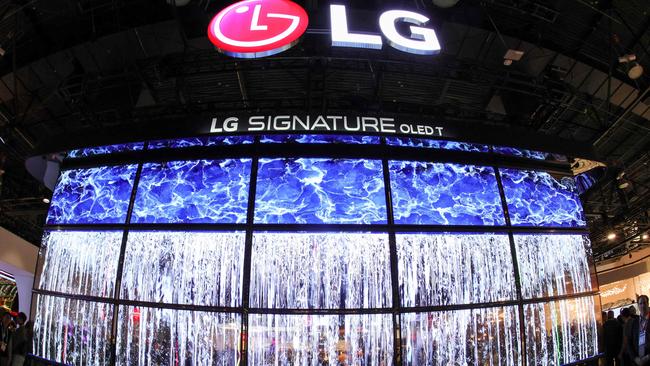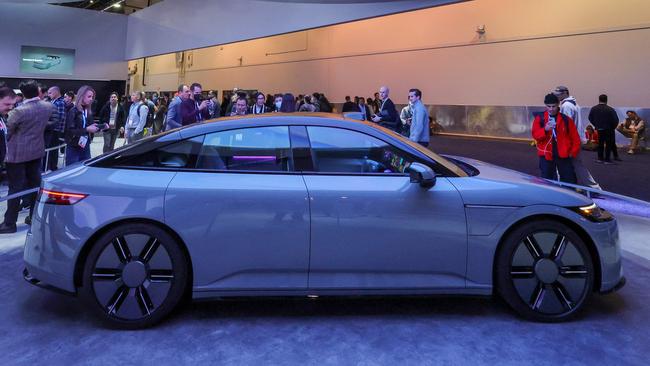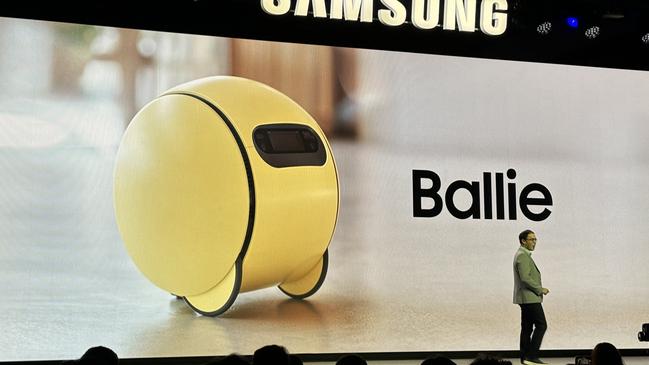CES 2024: A quarter of people find new artificial intelligence ‘scary’
In a few years’ time just about every appliance in the home could be full of it but many of us think it’s “intimidating” and even “scary”.

A hot new technology trend was on everyone’s lips at the world’s biggest consumer electronics show this week – as well as being embedded in half the new gadgets on display.
Artificial intelligence (AI) could be found in almost all the items in people’s homes in the next few years, from washing machines to barbecues and even nifty home help robots.
But the big tech brands, who were showing off their new AI enabled wares at the CES 2024 event in Las Vegas, have a huge problem.
Research by the organisers of CES has found a quarter of all people find AI not just a little but worrying, but downright “scary”.
AI anxious consumers fear they could be bringing home M3GAN, the murderous robot from the recent hit film of the same name.
And while more than 40 per cent of people believe AI to be “innovative”, only four per cent actually trust the technology.
No wonder tech firms in Las Vegas have been on an AI charm offensive, with powerhouse LG talking of “ethical AI” and even looking to rebrand artificial intelligence as “affectionate intelligence”.

Charm offensive to banish ‘scariness’
Research conducted in September by the Consumer Technology Association, the organisers of the CES event, found that when AI was mentioned the top three responses were that it was innovative (42 per cent), futuristic and intelligent (both on 35 per cent).
But concerningly, 30 per cent found AI “unpredictable,” 24 per cent “scary,” and 19 per cent “intimidating”.
Five per cent of people worried AI was “malicious” which was more than the four per cent who thought it was “trustworthy”.
The most obviously positive response from people about AI was the 24 per cent that found it “helpful”.

The research was done in the US but there’s little to suggest Australians would think any differently.
Indeed a University of Queensland and KPMG Australia study from early 2023 found only 40 per cent of Australians trusted the use of AI in the workplace.
Fears we will all lose our jobs to robots that use chatGPT may be overblown, but it hasn’t helped.

Tech companies are keen for consumers to focus on AI’s more mundane uses, such as smart appliances that can respond to conditions around them and act accordingly.
AI enabled washing machines, for instance, claim to be able to detect the level of dirt on a pair of jeans and adjust the cycle accordingly.
The Ella AI powered Smart Stroller can recognise if it begins careering down hill out of control and will break automatically. Or if you want to hold your baby and walk it will self-drive itself beside you.
Japanese firms Sony and Honda showed off the Afeela concept car that features an AI voice assistant.

‘Industry has a job to do’
“The technology industry as a whole has a job to do in educating consumers around AI without a doubt,” Samsung Australia’s consumer electronics chief Jeremy Senior told news.com.au on the side lines of CES.
“But at its simplest form, AI is all about taking complex tasks and making them easier.
“AI has been in our products for a long time – whether we have referred to it as AI or otherwise – the functionality is about taking complex calculations and delivering a benefit to consumer.”
What was merely “smart” tech in 2022 could now be AI.
LG’s Australian marketing director Gemma Lemieux told news.com.au in Las Vegas that AI was about learning customer behaviours to “create value in their everyday”.
“Our commitment lies in the ethical deployment of AI, holding ourselves accountable for both positive outcomes and potential challenges,” she said.
“With a focus on user benefit, safety, and the secure handling of personal data, we’re creating responsible AI systems that securely support our customers.”

Affectionate intelligence
LG wants people to forget the word “artificial” completely and switch to “affectionate intelligence” because it claimed, “AI can foster a customer experience that is more caring, empathetic and attentive”.
Both Korean giants, clearly aware of consumers’ concerns over the privacy and safety have insisted how secure the new technologies would be. LG has its LG Shield program for instance.
Two of the showstoppers at CES are AI enabled home robots – one each from LG and Samsung.
They both do similar tasks. They can “patrol” the home and inform you if things go awry.
If a pet breaks a plant pot the robot can activate its fellow robot vacuum to clean up the mess while sending you a picture of the damage.
The small devices on wheels can also turn on and off lights, scan YouTube videos or Zoom calls onto walls and even scan your face when you arrive home and if, for example, you seem down it can play some peppy music.
LG reckons its model could usher in a “zero labour home”.

Called smart home AI agent Q9 and Ballie respectively, both LG and Samsung’s robots are adorable with big eyes and curvy shapes, perhaps to make them seem less alien and more loveable.
But while robots roaming the living room at night can seem like the epitome of the bright AI future, the tech is in many other products in CES in a far subtler and less flashy ways.
New computers sport AI chips that far from grassing up your petulant pooch are simply about driving more efficient PC performance.
Yet even among AI aficionados, there’s a concern about artificial intelligence overload.
“AI is likely to be either the biggest star at CES or most annoying buzzword of the gadget showcase,” said Bloomberg reporter Austin Carr prior to the event.
While it may be scary to some, to others AI may even be getting a bit grating because it’s so vague it can mean anything. It can be huge technological advances or can simply be an on trend rebranding of tech that’s already used.
The reporter travelled and stayed at CES with the assistance of LG.
Originally published as CES 2024: A quarter of people find new artificial intelligence ‘scary’




